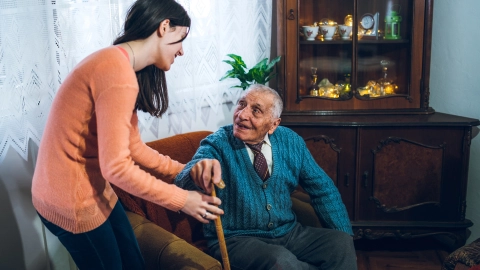Care Partial residential care: day and night care
Day and night care is a long-term care insurance benefit for people in need of long-term care who receive care at home. They are given care and support in a care facility for a certain amount of time during the day. This relieves carers and offers the care recipient social contact.
At a glance
- With day or night care, people in need of long-term care spend some time in a care facility where they are given nursing care and support but continue to live in their own homes.
- People with care grade 2 or above are entitled to a subsidy for this partial residential care.
- Partial residential care is possible during the day. It can be used on a short-term or long-term basis. Partial residential care at night is generally only available in very rare cases.
- Partial residential care can be combined with other long-term care insurance benefits.
- People with statutory and private long-term care insurance have equal entitlement to benefits.

What is partial residential care?
With day and night care, care recipients spend part of the day or night in a care facility during the week where they receive nursing care and support from trained nursing and support staff but live in their own homes for most of the time. This is why the term “partial residential care” is also used. As a rule, it is mainly night-time care that is provided. In contrast, partial residential care at night is only available in very rare cases.
This option of temporary nursing and care outside the home was created to complement care at home, relieving family carers, supporting care recipients living alone and dealing with crisis situations.
For this reason, long-term care insurance contributes to the costs for people in need of long-term care (care grades 2 to 5) with a subsidy towards costs. This care benefit for day and night care applies to both statutory and privately insured persons to the same extent. The amount is granted in addition to the care allowance or non-case care benefits. In principle, however, everyone can take advantage of the care offered at day and night care facilities and pay for it themselves if necessary.
Partial residential care can also be a stop gap solution in crisis situations. However, it can also be used on a long-term basis and indefinitely to complement home care.
Combination with other long-term care insurance benefits
People at care grade 2 or above can use partial residential day and night care in addition to outpatient care benefits in kind, nursing care allowance or a combination of both benefits – without this affecting the amount of the individual benefits.
Short-term care and respite care can also be requested if required.
What are the costs of day and night care?
Many different services are provided in partial residential care facilities.
Operators of care facilities calculate the following costs:
- Nursing and care
- Food and accommodation
- Investment costs
- Training levy
- Transport costs
Nursing and care
They include:
- Assistance with the basic daily activities such as help with eating, going to the toilet and moving around
- Post-treatment care, for example the administration of medication and blood pressure measurements
- Support: this includes activities intended to stimulate the care recipients, such as group activities like games, singing or walks.
The nursing care insurance or private long-term care insurance pays a certain subsidy towards these costs depending on the care grade. If costs are incurred that exceed the monthly long-term care insurance subsidy, the difference must be paid by the care recipients themselves.
Transport costs
The guests of a day care facility can use a transport service. This picks them up at home and takes them back home at the end of the day. The costs of this are also settled via the subsidy from the care insurance provider.
Food and accommodation
These include, for example the costs for meals, such as breakfast, lunch and snacks, as well as cleaning, laundry, events, heating, electricity and water. These costs are also known as hotel costs and must be paid by the care recipient themselves.
Investment costs
These include expenses for rent, furniture and maintenance, for example. These costs are also not covered by the long-term care insurance fund and must be paid as part of the personal contribution.
A few federal states contribute to the investment costs in day and night care and pay a subsidy if the legal requirements for this are met. More detailed information is available from the care facility or the local social welfare office.
Training levy
The guests of partial residential care facilities have to contribute to the cost of training new nursing staff.
Billing
Care recipients receive a monthly invoice detailing all the costs. They must transfer their own share, while the share from the long-term care insurance provider is settled with their care insurance fund direct. People with private insurance advance the amount and submit the invoice to the insurance provider and, if necessary, the subsidy office.
What subsidies do long-term care insurance providers pay for day and night care?
People with care grade 2 or above can finance some of the costs of day and night care via long-term care insurance benefits. These pay for care, nursing support and transport costs.
People can claim this long-term care insurance subsidy for day and night care if:
- they are at least at care grade 2
- they are cared for at home
- home care is not adequate for them or needs to be increased or supplemented
The amount of financial assistance for day and night care depends on the care grade. The entitlements are as follows:
- Care grade 2: up to 721 euros per month
- Care grade 3: up to 1,357 euros per month
- Care grade 4: up to 1,685 euros per month
- Care grade 5: up to 2,085 euros per month
People who are assigned care grade 1 can use the monthly budget of 131 euros from the additional relief allowance to finance partial residential care proportionately.
For the remaining care grades, the additional relief allowance can also be used to pay the care recipient’s own share, including the cost of accommodation and meals.
If the benefits from the long-term care insurance fund, a person’s own income and assets are not sufficient, social assistance can be requested. However, the application should be submitted before availing of the benefits. Information centers can also provide information about what financing options are available.
People without an assigned care grade do not generally receive any long-term care insurance benefits.
How do I apply for partial residential care?
Anyone wishing to use day or night care must submit an application to the long-term care insurance provider or the private long-term care insurance provider for the person in need of long-term care.
A reason must be given for requiring partial residential care. There is, however, no review carried out by the long-term care insurance provider or the Medical Service. The day care facility can support the justification.
The care recipient can also grant another person the power of attorney to make the application on their behalf. In this case, a copy of the power of attorney must be attached to the correspondence.
The long-term care insurance provider then submits the relevant application form.
The Consumer Advice Center provides a sample letter that can be used to apply for day or night care.
When is partial residential care required?
Specific reasons for partial residential care can vary and depend on the specific person in need of long-term care, the carer or the general care situation. No objective criteria have to be met.
This means day care can be requested, for example, if the carer feels overburdened – even without the threat of burnout or burnout having already occurred.
When making the application to the long-term care insurance provider, a plausible and understandable reason suffices. For example:
- The carer is in full or part-time employment. There is no minimum number of hours a week to which care services are tied.
- The carer needs to be relieved from nursing care and support, for example to prevent physical and psychological problems.
- The carer needs relief if people in need of long-term care have to be constantly supervised, such as people with dementia and other mental impairments.
- Night care can give relatives a break when special attention is also needed at nighttime, for example in the case of people with dementia, especially if the day-night rhythm is disturbed.
- The care need increases and rehab measures can be better implemented in the partial residential care facility.
- The person’s health deteriorates temporarily and more nursing is required.
- Single people with care needs have a desire for social contact or benefit from a fixed daily structure.
If you are unsure whether partial residential care is an option for you, get advice first.
How are care recipients in partial residential care supported?
Promoting the health of care recipients and preventive services are part of the work of day care facilities. These are intended to boost guests’ physical and mental health, their abilities and their social life.
The aim is to support and encourage day care guests without overwhelming them. Ideally, the activities are adapted to the desires, needs, life circumstances and capabilities of the guests. A trial day is useful to get a better impression.
Promotion and prevention are, among other things, a part of everyday work. This means that meals and activities, such as music-making or walks, always take place at the same times and on the same days, with the activities being based on the current season. The fixed daily structure and link to the time of year help people cope better with everyday life, especially in the case of people with dementia and other mental impairments. The nursing staff usually instruct the care recipients and encourage them to join in and try these things out so that they can practice being independent and exercise their physical and cognitive abilities.
Guests in partial residential care facilities are also entitled to additional activities to improve their health and support them. There is no need to apply for these and payment is settled directly between the care facility and the long-term care insurance provider. Guests must not be billed for these costs.
If you have any questions about what is on offer in your facility, you should talk to the facility manager.
How can I find a suitable facility?
Many factors play a role when selecting a suitable care facility – both personal needs and preferences and how specialized the facility is.
Make a list of things and activities that are important to you. You can then compare the list with the programs and prices offered by the facilities. You are entitled to pre-contractual information, including the prices of the facilities and the services that are relevant to you. This helps you compare the various options. Many facilities also offer free trial days. These are also very helpful to find out whether the services match your own ideas.
The results of an external quality assessment by the Medical Service provide information on the quality of a facility. This annual review is obligatory for all care facilities. The review record must also be included in the pre-contractual information. The results are usually also available to download on the website of the facility or can be requested from the care facility.
It is not easy to find a partial residential care facility in all areas of Germany. Barely any care facilities offer night-time care. In some rural areas, there are also only a small number of partial residential care services. If you can’t find anything suitable in your area, contact a care consulting service. Advice centers often have a general idea of nursing care and support options or know what else is on offer.
Comparison portals and lists
The results of the quality assessment are published in the databases offered by various portals, where users can search for facilities on the basis of individual criteria.
Reputable search portals include:
- Federal Association of Public Health Insurance Companies (AOK-Bundesverband): Care Navigator (Pflegenavigator)
- Federal Association of Company Health Insurance Funds (BKK-Dachverband): CareFinder (PflegeFinder)
- Association of Substitute Health Insurance Funds (Verband der Ersatzkassen – VDEK): Care Guide (Pflegelotse)
Who can provide advice about day and night care?
You can contact care advice centers for advice on any questions relating to partial residential care, for example, care support centers, the long-term care insurance provider or other municipal advice facilities and social and welfare associations.
Those with private insurance can contact Compass Pflegeberatung (Compass Care Consulting).
You can find a care advice center near you in the database of the Center for Quality in Care (Zentrum für Qualität in der Pflege, ZQP).
The advice on care services is available free of charge.
Examples of advice on day and night care:
- General uncertainties among care recipients and their relatives about whether partial residential care is an option for them
- Help with looking for suitable care nearby or alternative options for nursing care
- Help completing applications
- Information about other financing options
- Other benefits and assistance that may be available in your personal case, and how these can be combined with partial residential care
If you have shortlisted a day care facility, you can also get advice there.
Many facilities also provide “taster and trial days” that enable people to receive advice and check out the facilities.
- Bundesministerium der Justiz. Elftes Buch (XI) – Soziale Pflegeversicherung. Stand: 30.05.2024.
- Bundesministerium für Gesundheit. Tagespflege und Nachtpflege. Aufgerufen am 16.12.2024.
- IGES Institut. Berichtspflicht der Länder zu Förderung und Investitionskosten von Pflegeeinrichtungen. Berichtsjahr 2020. Berlin 2021.
- Rolfs C, Giesen R, Meßling M, Udsching P. Beck'scher Online-Kommentar zum Sozialrecht. SGB XI. 75. Edition. Stand: 2024.
- Verbraucherzentrale. Tages- und Nachtpflege: Eine Stütze für die Pflege zuhause. Aufgerufen am 16.12.2024.






